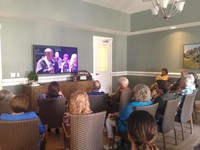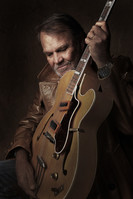

Sandy Rambus knows what it’s like to watch a loved one struggle with dementia. The Jacksonville resident has experienced the daily challenges since 2005, when her husband, Carl, was first diagnosed with the disease. So when she learned that Arbor Terrace Ponte Vedra was offering a free screening of the documentary “Glen Campbell: I’ll Be Me,” she was eager to attend.
“I think it’s fabulous that they have this going on and they open it to the public,” Rambus said. “The more you learn about this disease, the better.”
The Rambuses joined an audience of local residents and senior service providers for the free screening, held at Arbor Terrace’s dedicated memory care facility on Palm Valley Rd. Complete with popcorn, candy and a free pizza to take home after the screening, the event offered attendees the chance to gain a new perspective on a disease that currently affects more than 5 million Americans.
“This feature is very near and dear to our hearts,” said Ilene Thrasher, senior care counselor for Arbor Terrace Ponte Vedra. “It really helps people understand what it’s like to live with someone day after day, moment by moment, as they struggle with this disease.”
Georgina Leininger, director of sales and marketing for Guardian Pharmacy, agreed. “For people filling medications, I think documentaries like this really bring home just who it is they’re serving,” she said. “They’re not just filling prescriptions; there’s a real person there.”
A music legend
For people of a certain generation, Glen Campbell’s music was an integral part of the soundtrack of their lives. The Grammy Award-winning singer of “Gentle on My Mind,” “By the Time I Get to Phoenix,” “Wichita Lineman” and more was one of the biggest stars of the 1960s and ’70s, dominating the music charts, hosting his own television show and appearing in movies such as “True Grit” with John Wayne. But a string of failed marriages and years of alcohol and drug addiction took their toll on his career; the singer credits his fourth wife of more than 30 years, Kim, with turning his personal and professional lives around.
“Glenn Campbell: I’ll Be Me” chronicles the singer’s more recent history: When the film begins, it is 2011 and Campbell is about to go on tour to promote his latest album, “Ghost on the Canvas.” In between rehearsals, he visits the Mayo Clinic in Minnesota, where he receives confirmation of what his family has suspected for some time: The singer has Alzheimer’s disease.
“It’s really hard,” wife Kim Campbell says as tears well in her eyes. “But I just have to maintain as long as I can and keep him happy and healthy.”
Despite the diagnosis, Campbell and his band – which includes his three youngest children – decide to move ahead with the tour, and the film chronicles what becomes an extended musical goodbye to his fans.
While the backdrop may be show business, “Glen Campbell: I’ll Be Me” reveals the slow, painful degeneration of dementia and one family’s efforts to help their loved one stay connected to those relationships and interests that make him who he is and his life worth living. For Campbell, that is unquestionably music. As the tour begins, both family members and medical professionals are amazed at how well he can perform despite his advancing disease. Even as a TelePrompTer feeds Campbell the lyrics to his popular hits, he flawlessly performs intricate guitar solos with the same skill and dexterity that made him one of the leading guitarists of the 1960s. As a member of the legendary group of studio session musicians known as “The Wrecking Crew,” Campbell played guitar on countless hits for everyone from The Beach Boys to Frank Sinatra.
As the tour begins, Campbell appears to hold his own on stage. Behind the scenes, however, family members struggle to accommodate the first physical and behavioral signs of the disease. When the singer is booked to appear on The Tonight Show with Jay Leno, they fear Campbell may not be able to make it through the performance.
“We were terrified he wouldn’t be able to get through the song – that he’d just wander off into the audience,” daughter Ashley admits.
Because Campbell chose to publicly disclose his illness, however, the audience is aware of his condition and they embrace all the more his performance of “A Better Place,” the lyrics for which are particularly poignant:
Some days I’m so confused, Lord
My past gets in my way
I need the ones I love, Lord
More and more each day
One thing I know – the world’s been good to me
A better place awaits, you’ll see
Throughout the documentary, artists pay tribute to Campbell’s musical legacy, including Sir Paul McCartney, who praises the singer during a backstage visit at the Grammy Awards, where Campbell received a Lifetime Achievement Award. The film also includes interviews with artists ranging from Bruce Springsteen and Keith Urban to the Red Hot Chili Peppers’ Chad Smith, who describe their own experiences watching a loved one struggle with dementia and praise Campbell for having the courage to share his journey with the public.
“How many families are going through this?” asks country singer Kathy Mattea, whose mother died of complications from Alzheimer’s disease. “He is opening up such a conversation.”
The cameras follow Campbell and his family as they travel to Washington DC to meet with lawmakers and testify before Congress in support of increased funding for dementia research.
“When I play (banjo) with my dad, it’s getting harder for him to follow along,” Ashley tearfully tells Congress. “It’s getting harder for him to recall my name…one day he will look at me and I will mean absolutely nothing to him.”
As Campbell performs at the Library of Congress, viewers hear from fellow Arkansas native and former President Bill Clinton about Campbell’s contributions to the fight against Alzheimer’s disease.
“He has brought a clarity to this issue,” Clinton says, noting that millions of Americans may one day benefit from Campbell’s advocacy for increased funding for Alzheimer’s research. “That may be a more enduring legacy than all the music he made.”